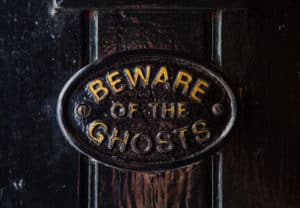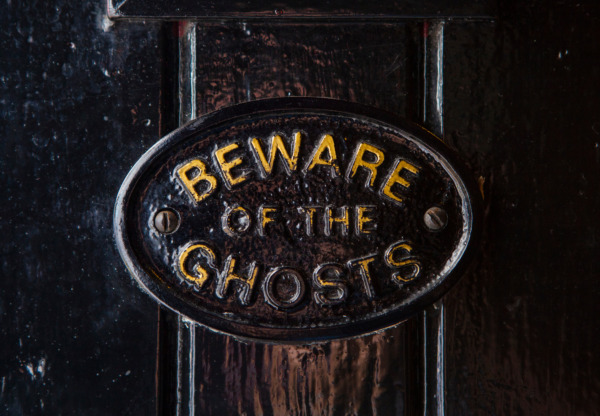
Halloween is upon us once again and as our minds turn to ghosts and ghouls, you might be thinking of selling or buying a haunted house. You might be wondering if that Victorian House you’ve got your eye on, the one with the south facing garden, period features, high ceilings, attic ripe for conversion and just along the road from a great school just might have a floating headless lodger or had a tragic visit from an axe-murderer in the dim and distant past. Or you might be selling a property and wondering just what you have to disclose about the property. Read on to find out more.
I live in a haunted house, should I declare this to potential buyers?
There isn’t a question about paranormal activity in the home report. It’s really up to the purchaser to make sure they’ve gathered all of the information relevant to the property, which is why there are so many reports and questions solicitors ask or commission on behalf of their clients.
You have an obligation to disclose anything which might affect the value of the property, but if a year after the sale the buyer came back and said you hadn’t disclosed a ghost, how would they prove the ghost actually existed?
Even if they could prove the ghost existed, they’d also have to prove that the ghost was present before they bought the house. After all, if we’re really discussing this, it could be that the buyer has a family ghost that didn’t want to be left behind in the buyer’s property.
What if the buyer asks if the property is haunted?
An interesting point might be if you were asked a direct question by the buyer like ‘have you ever seen or experienced anything that could be classed as paranormal activity in the property’? If you truly believe you have experienced a ghostly presence and you don’t disclose it when asked, the buyer could in theory think about pursuing a case of misrepresentation against you if he/she then claimed to have seen a ghost after buying the property. But the buyer would have to be able to prove they’d actually seen a ghost, which, ahem, might be a little difficult.
Once you’ve agreed to buy or sell a property, ALL communication after the initial agreement should be dealt with by your solicitor. This avoids either party saying anything in passing, or off the record, or sarcastically, or in any way that can be misconstrued at a later date. Most solicitors who received the question ‘is there anything else the buyer needs to know’ would respond that it is too wide an enquiry and refuse to answer it.
Selling or buying a haunted house – Is a ghost likely to increase or decrease the property price?
That’s a difficult question to answer generically – it depends on the property and the circumstances and how the buyer feels about paranormal activities. We know of some people who would run a mile at the idea of buying a haunted house with a ghost and others who would love what would be a unique feature! The best way to get a good valuation on any property and to talk over how to maximise the likely sale value is to get in touch with Wallace Quinn and we’ll have one of our Estate Agency team talk you through everything.
What if somebody died in the property – do I have to declare that?
Dying at home is more common than you might think and the older your property, the higher the chance. If you live in a one hundred year old property that you bought 5 years ago from somebody you didn’t know, how sure would you be that nobody had ever died there?
It’s more complicated if something gruesome recently happened in the property (the sort of thing you might eventually see in a Hollywood horror script) when we’d have to consider consumer regulations.
Have you any other advice for selling or buying a haunted house?
Yes! If you’re buying a haunted house, or if it’s close to midnight and something evil’s lurking in the dark. Or if there is something strange in your neighbourhood, who you gonna call?
Wallace Quinn – because we ain’t afraid of no ghosts.
